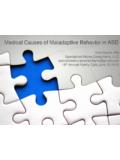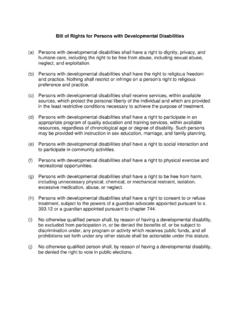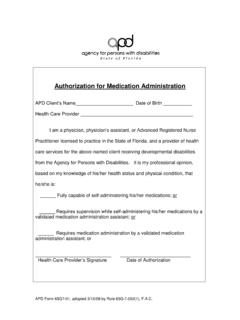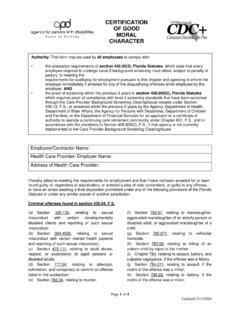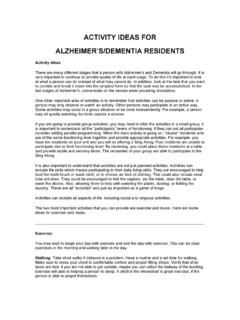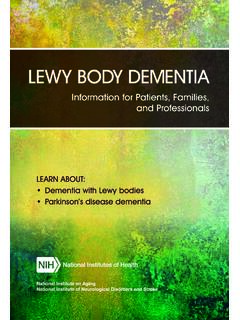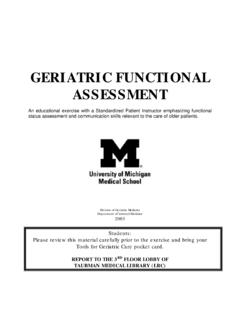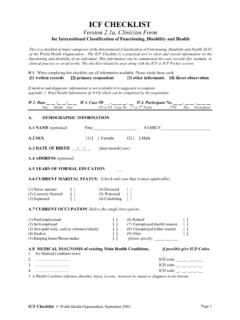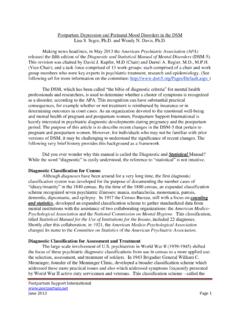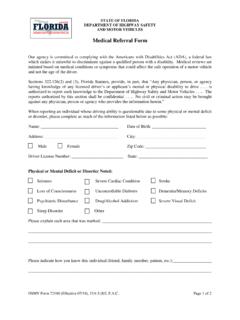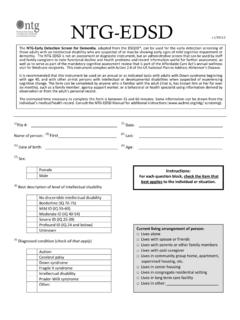Transcription of Intro to Dementia slide handouts - Florida
1 6/9/20101 Vascular Dementia Accounts for about 20% of Dementia Can come from a series of strokes in large and small vessels. (anoxia) Prevention is the key: Dementia -Non Alzheimer's Brain tumor AIDS Head trauma Syphilis Vitamin B12 deficiency Other systemic infectious, metabolic, toxic and degenerative causes Depression- Pseudo- Dementia Treatable Dementias NPH (Normal pressure hydrocephalus) Enlargement of ventricles which compresses brain tissue without increase intracranial pressure Sign & Symptoms* Dementia *Ataxia *Urinary incontinence Vitamin 12 deficiency Can affect cognition at blood levels below 400 Thyroid disturbance Hypothyroidism-mental lethargy, dulling of cognitive function Hyperthyroidism-irritability, inattention Tertiary syphilis- AKA Neuro-syphilis Spirochete infection Occurs 2-2- years after primary infection Penicillin IV = Tx of choice6/9/20102 Treatable Dementias Diffuse Lewy Body Disease 20% of Dementia Seems to progress faster than Alzheimer s Disease Main symptoms are.
2 Fluctuating cognitive impairment Visual hallucinations Parkinsonism Extreme Neuro-leptic sensitivity** AVOID ANTIPSYCHOTIC DrugsVascular Dementia Accounts for about 20% of Dementia Can come from a series of strokes in large and small vessels Prevention is the key:Parkinson s Disease & Dementia Syndrome of badykeinesia, resting tremor, rigidity (+flat affect, shuffling gait) 18-40% of PD develop Dementia Patients who are older at onset are more like to develop Dementia with PD Patients who develop tremors are less likely to develop the Dementia Dementia s Huntington s Disease (ages 35-40 onset) Hereditary Signs & symptoms Dementia , personality changes and also have psychosisDementia Complex 2/3 of those who die from AIDS Signs & symptoms forgetfulness, slowed thinking and poor concentration that progresses.
3 Antiretroviral drugs delay the development and slow the Dementia s Pseudo Dementia A termed used by Wells in 1079 to describe reversible cognitive changes that occur in depressed older adults that are often misdiagnosed as Dementia 10-20% of depressed patients have significant cognitive impairment. Signs & symptoms Poor short term memory and recall, but relatively good recognition Loss of ability to dress and groom Poor effort on testing: I don t know TX: Dementia improves with treatment of depression. 6/9/20104 Stage 1 Forgetfulness Client may or not be aware he is having difficulties Memory loss Disorientation Apraxia (forgets how to use tools and appliances) Anomia- forgetting names Client may or not be aware he is having difficulties Memory loss Disorientation Apraxia (forgets how to use tools and appliances) Anomia- forgetting names6/9/20105 Symptoms Stage II Poor short-term memory Disorientation (person,place,time) Inability to perform skilled movements (shoelaces, eating utensils, etc) Language difficulties Social withdrawal Fewer inhibitions AgitationSymptoms Stage II (cont d)
4 Restlessness, pacing, wandering, pacing Sleepiness Sever Sleep Disturbances Hallucinations or delusions Changes in eating HabitsSymptoms-Stage III(severe Dementia ) Little or no memory Great Difficulty communicating with others No recognition family/ friends Difficulty remembering how to eat Loss of bowel/ bladder control Increased frailty (muscle weakness, susceptibility to infections and illnesses)6/9/20106 Caregiver Guide Day to Day care of an individual with Dementia can be stressing Need a Plan of Care that changes as the needs of the consumer change Changes are needed in the physical environment as well as the social and emotional environmentsDressing and Grooming Maintain a ROUTINE Comfort of the Environment Provide assistance only as needed DON T ARGUE OR FORCE A PERSON TO CHANGE HIS CLOTHES!
5 Don t offer too many choices of things to wear Glasses: make sure you have more than one pair of glasses available, and a copy of the prescriptionStressors As the Patient s condition becomes worse, the role of the caregiver increases: Priorities of the caregiver must be rearranged to accommodate the care of the Catastrophic Reaction-responding to situations tat overwhelm the capacity to think, perform and control their emotions. Wandering Sundowner s Syndrome (increase in confusion in late afternoon or early evening Sexual BehaviorsProblem solving (cont d) Plan of Action Put the plan into action Evaluate the Plan Ongoing Re-evaluationGeneral Management Guidelines WANDERING Reduce excess Stimulation Provide meaningful activity Evaluate Medications Use a toileting Schedule Use ID bands or alarm bracelets6/9/20108 General Management Difficulty With Personal Care Break task into small steps Be patient, allow time Demonstrate and allow patient to perform the parts of the task they are still able to do Arrange clothes and other items (toothbrush, toothpaste))
6 In the order they are to be usedGeneral Management Suspiciousness/paranoia Offer to help find lost objects Don t argue or reason; don t take personally Distract or change subject Introduce self and role on a regular basis Reassure Medication evaluation Check out the validity of the situationGeneral Management Agitation Assess/manage sources of pain, constipation, infection, full bladder Medical evaluation: eliminate caffeine/alcohol Schedule adequate rest Do not put in failure-oriented situations Redirect energy to a suitable task Be consistent6/9/20109 General Management Sleep disturbance Medical evaluation; Antidepressant medication if indicated Later bedtime; More daytime exercise Check room temperature, use nightlights Limit caffeine and alcohol Nighttime snack Limit naps
